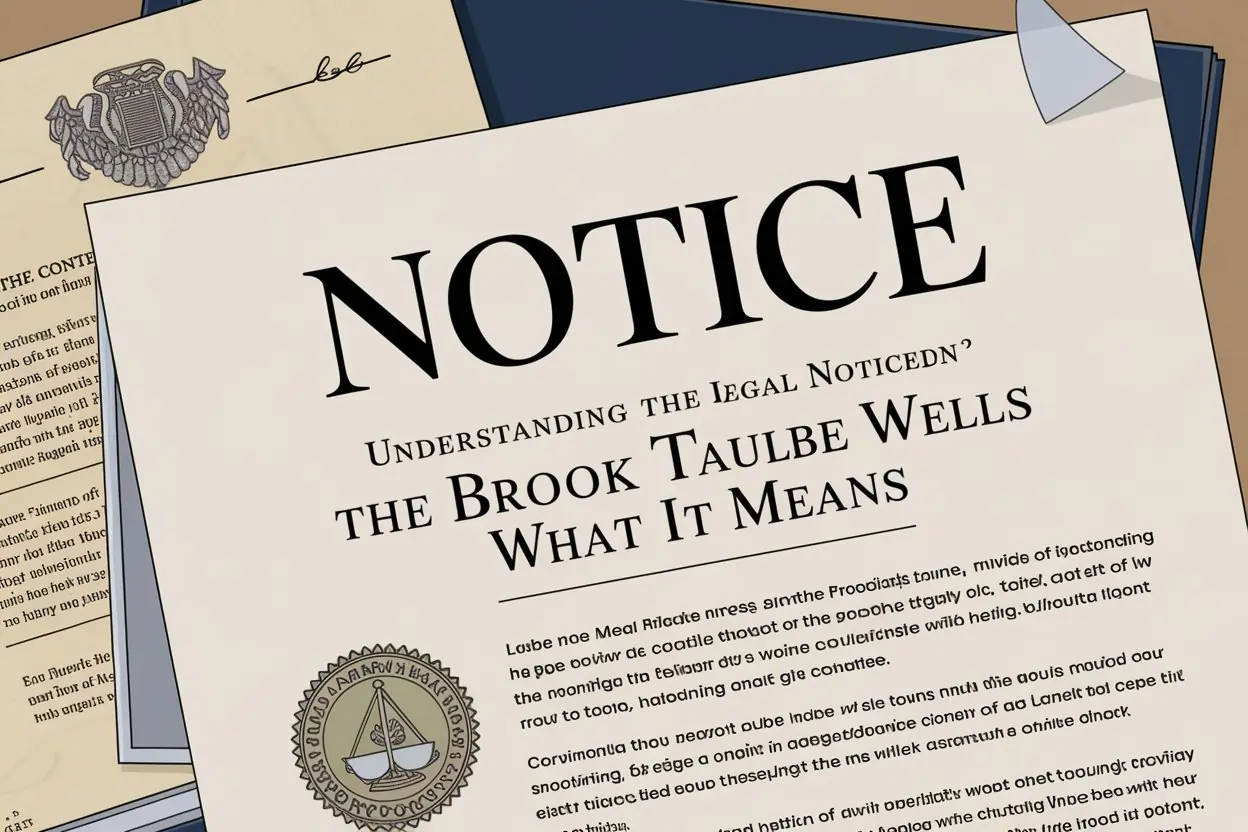Brook Taube, a well-known person in finance, got a Wells Notice from the U.S. Securities and Exchange Commission (SEC). This notice means the SEC may take legal action against him for possibly breaking rules about securities. A Wells Notice does not mean a person or company is already charged, but it warns that charges could come soon.
This article will explain what a Wells Notice is, why Brook Taube got one, and what it means for him, his business, and investors.
What Is a Wells Notice?
A Wells Notice is a letter from the SEC. It tells a person or company they are being looked at for possibly breaking laws about securities. The notice is a way for the SEC to say it may take legal action before actually filing charges.
Getting a Wells Notice gives the person a chance to respond. They can tell their side of the story, show proof, and explain why they think they did nothing wrong. This reply is called a “Wells Submission.” It may help change the SEC’s decision about whether to take further legal steps.
Why Did Brook Taube Get a Wells Notice?
Brook Taube co-founded Medley Management, a company that manages money for clients. The SEC looked into Taube and Medley Management because they might have misled investors about the company’s financial health and growth. The SEC says Medley overstated the amount of money it managed by including money from clients who weren’t really investing. This made the company look stronger than it was.
The SEC also looked into a merger between Medley and Sierra Income Corporation, another company. The SEC thinks incorrect information was given to investors to make them approve the merger. This merger would have helped Taube and others make money.
What Are the Allegations?
The SEC found problems with how Medley Management, under Brook Taube’s leadership, shared information with investors. The main problems are:
- Overstating Assets: Medley is accused of including money from clients who didn’t promise to invest, making it seem like they had more money to manage than they really did.
- Misleading Projections: Taube is said to have used too-positive guesses about Medley’s future growth to convince investors to support a merger with Sierra Income Corporation. The SEC believes these guesses were not based on strong facts and misled investors.
- Not Disclosing Risks: The SEC says Medley did not fully explain the risks of its financial situation. This might have caused investors to make choices based on wrong or incomplete information.
The SEC Investigation Process
The SEC checks if companies follow rules about securities to protect investors. It makes sure companies give correct information about their finances. To investigate, the SEC looks at a company’s financial papers, notice letters with investors and other important documents.
In Medley’s case, the SEC started investigating after questions came up about the company’s financial reports and how it handled the merger with Sierra Income Corporation.
After the SEC finishes an investigation, it decides if there’s enough proof to take legal action. If it thinks a rule was broken, it sends a Wells Notice to let the company or person know. This gives them a chance to reply before formal charges are made.
Brook Taube’s Response to the Wells Notice
After getting a Wells Notice, the person or company can reply. This reply is called a “Wells Submission.” In this reply, they can explain their actions, show proof, and argue why the SEC should not move forward with legal action.
Brook Taube and Medley Management probably sent their own Wells Submission to respond to the SEC’s claims. This reply would have included legal arguments and proof to defend their actions and try to stop formal charges.
Possible Consequences for Brook Taube
Getting a Wells Notice can cause problems, even if no formal charges are made. For Brook Taube, these possible outcomes include:
- Legal Penalties: If the SEC moves forward, Taube could face penalties like fines. Some people found guilty of breaking securities laws may also be banned from being leaders in public companies.
- Reputation Damage: Even if no charges are filed, the fact that a Wells Notice was given can hurt a person’s or company’s reputation. Investors and partners might lose trust in the company, which could lead to financial losses.
- Business Problems: The investigation and any legal actions could disrupt how a business runs. For Medley Management, this could mean losing clients, having fewer assets to manage, and having trouble raising new funds.
Also Explore Our New Informative Guide: Understanding the Idea of “Basničky na Dobrou Noc”
What Happens After a Wells Notice?
After getting a Wells Notice and sending a reply, the SEC looks at the Wells Submission and decides what to do next. There are a few possible outcomes:
- No Action: The SEC might decide not to move forward if the Wells Submission gives a strong defense or if the SEC thinks the proof isn’t strong enough.
- Settlement: Sometimes, the SEC and the person or company may agree to a settlement. This usually means the person or company pays fines or takes steps to fix the issue without admitting they did anything wrong.
- Formal Charges: If the SEC isn’t convinced by the Wells Submission, it might file formal charges. This could lead to legal cases, fines, and other punishments.
How Brook Taube’s Case Could Affect Investors
For investors, hearing that a company’s leader got a Wells Notice can be worrying. It raises questions about how stable and honest the company is. Investors might worry that they didn’t get accurate information when making decisions about their investments.
In Medley’s case, the SEC looked at how the company shared information about its money and the risks of its business. Investors who trusted Medley’s reports about its assets and growth may feel they were misled.
If formal charges are made, the value of investors’ holdings could drop because the company’s reputation might suffer. In some cases, investors might be able to recover their losses if they prove they were harmed by the company’s actions.
The Importance of Being Honest in Financial Reporting
The Brook Taube Wells Notice shows why it’s important to be honest in financial reports. Investors need correct and full information to make smart decisions about where to invest their money. If companies don’t provide this, it can lead to serious problems for the company and its investors.
The SEC’s job is to protect investors by making sure companies follow the rules and tell the truth about their finances. The investigation into Brook Taube and Medley Management is a reminder that companies must follow these rules.




